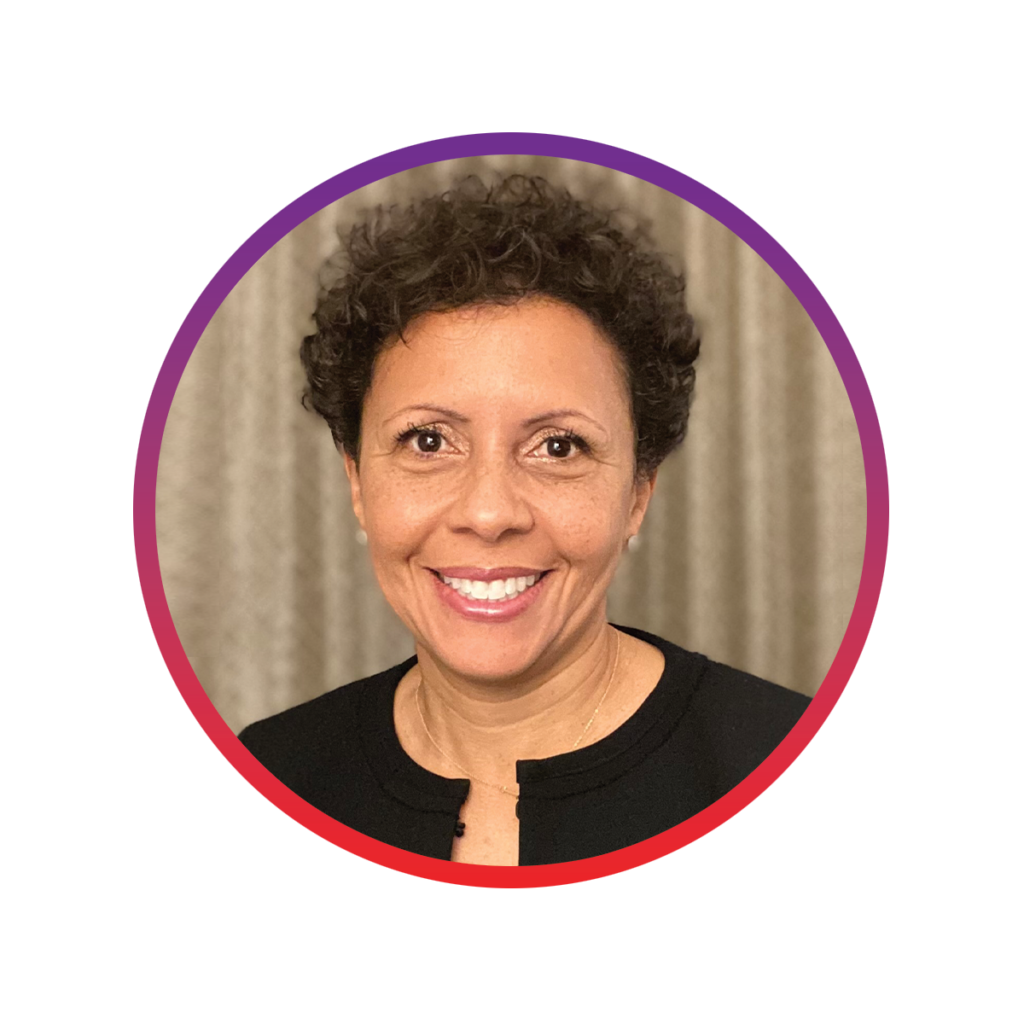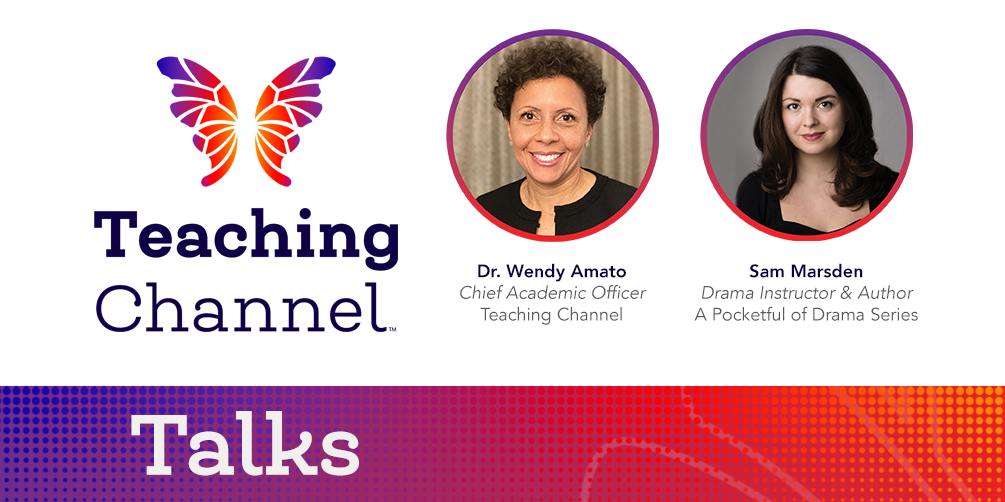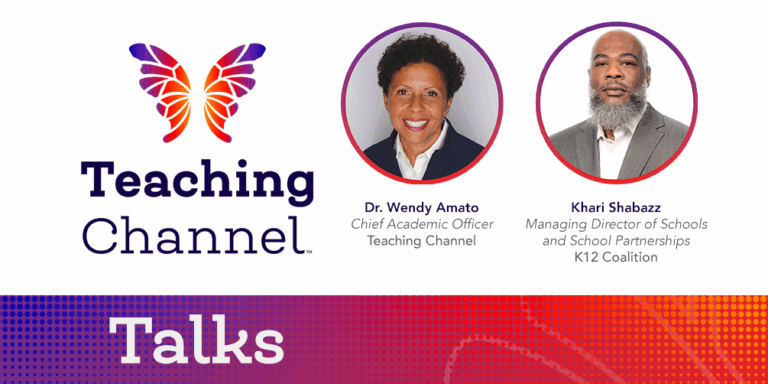How can drama transform learning beyond the stage? In this episode of Teaching Channel Talks, our host Dr. Wendy Amato welcomes Sam Marsden, drama instructor and author of Drama Games for Early Years, to explore drama as a powerful interdisciplinary tool for every classroom. Sam opens up about her personal journey with dyslexia and how drama helped her overcome learning challenges, while also explaining how it fosters safe spaces for authentic self-expression. Tune in to discover practical strategies to harness drama’s power to boost student engagement and confidence in your classroom!
Our Guest

Sam Marsden is a drama instructor, author, and advocate for creativity and self-expression in education. She holds degrees from The Royal Central School of Speech and Drama and a first-class honors degree in International Development Studies and Sociology, for which she received the David Weeks memorial prize. With over a decade of experience teaching drama, Sam combines her passion for the arts and personal experience with dyslexia to inspire students. Sam regularly writes for The Stage, Spotlight, and Teach Primary, and she is the author of several educational resources, including 100 Acting Exercises for 8-18 Year Olds.
Connect with Sam Marsden on her website, or on social media: Instagram | X
Our Host

Dr. Wendy Amato is the Chief Academic Officer at Teaching Channel’s parent company, K12 Coalition. Wendy earned her Master’s in Education and Ph.D. in Curriculum and Instruction from the University of Virginia. She holds an MBA from James Madison University. Wendy began teaching in 1991, has served as a Middle School Administrator, and still teaches at UVA’s School of Education. She has delivered teacher professional development workshops and student leadership workshops in the US and internationally. Wendy and her family live near Charlottesville, Virginia.
Resources for Continued Learning
Sam Marden has many resources for Teaching Drama to Empower Your Students, including her latest book, Drama Games for Early Years: (4-7 Years), mentioned in this episode. She has also written books on acting games for 8-18 year-olds, improv, and creative writing.
Even if yoou’re not a drama instructor, these games can help your students express themselves and get out oof your comfort zone. Sam has provided a free sample from one of her books to get you started.
Episode Transcript
Dr. Wendy Amato: Welcome to Teaching Channel Talks. I’m your host, Wendy Amato, and as often as I can, I jump into conversations about topics that matter in education. And today I’m bringing you a drama instructor who has authored books on acting and improv for students. Let’s explore the valuable element of drama in education.
Sam Marsden, welcome. Thank you so much for having me. I’m delighted to
Sam Marsden: be here.
Dr. Wendy Amato: Jump in and tell us why this topic is personal for you.
Sam Marsden: Well, I have dyslexia and when I was a child, reading and writing were extremely stressful for me and I would just shut down and I couldn’t actually read until I was 14 and I kept it a secret and I found all these ways to kind of hide it from teachers that I couldn’t read and write.
And I didn’t go to great schools, if I’m honest, so it was quite easy to hide it. And then we had this teacher from Texas, actually, from America, that came to our English secondary school. And she was very exotic, everyone was very excited by her. And bless her, within a few weeks she spotted that I couldn’t read or write.
And she very quietly took me aside and was like, I’m gonna help you. And she knew I had a passion for drama. Drama was the one subject I was good at at school. And I was always in the school plays and always improvising and playing around. And She took me after school, a lot of Tuesday and Thursday, I remember very clearly for about an hour and helped me read and write through drama.
So my passion got even greater for it. And I started teaching actually when I was 17. So I’ve been teaching for nearly a couple of decades now.
Dr. Wendy Amato: There’s no question then, this was a life changing experience for you.
Sam Marsden: Yeah, absolutely. And I think drama was the place where I felt seen and I felt heard. And it’s a beautiful place to express feelings.
Even when it’s not necessarily you, you’re playing, you’re playing another character. But you just let off this steam, this emotional steam that many of us have as young adults. So it’s not just, you know, reading and writing, there’s the emotional element of it as well, of this release.
Dr. Wendy Amato: And so, Sam, having benefited so richly from using drama in your own educational experience, what do you hope to give to learners through the books and the work that you do now?
Sam Marsden: Yeah, for learners, I hope to help them feel connected to themselves and to their essence and their intuition. And I think that when you can get this internal connection You learn to trust yourself. And when you can trust yourself, you’re just in a better mindset for learning in all subjects. Because you feel like you can, you know, try and think of the answers.
You’re not just looking up to your teacher and saying, Please tell me all the answers. You’re saying, Hey, do you know what? I’ve got something in me. I’ve got a curiosity in me. I’m I can do these things for myself and I can try and join the dots myself. And when you’ve got students who are doing it from an internal place, it’s just so much stronger.
Dr. Wendy Amato: Curiosity is certainly an important characteristic for a learner to have. We want students thinking constantly in class. Tell me a little bit, please, Sam, about improvisation and how that supports the learning process. curiosity and active thinking.
Sam Marsden: So in improvisation the key thing that you teach is listening.
And this is one of the great things about acting. You know, there’s many quotes from wonderful actors and they say actually acting is listening. And you’re not thinking, Oh, how am I presenting myself? And you know, what do I look like? And stuff like that. You’re putting yourself in the moment. and you are fully connecting with that person you’re improvising with and you’re reacting to what they’re saying and you’re curious about that person you’re with.
and you’re also curious about the characters that you’re creating in improvisation. So I think you’re also taught to go with the first idea that comes into your head in improvisation. So you go with that first gut instinct and failure is encouraged and you create a safe space. So I’m always going on about a safe space in drama because there are, you know, some drama teachers that maybe push you.
students in a way that doesn’t feel safe to them. So it’s really important the whole time, I think to always let it come from the students and never to be pushing them into something they’re uncomfortable with. And I will often say, you know, I’m not going to force you into anything and you can volunteer yourself.
And after three or four weeks of creating this safe space, you find they’re all volunteering anyway to go into it.
Dr. Wendy Amato: What does it mean to create a safe space and what recommendations might you offer to a teacher to create safety in the learning environment?
Sam Marsden: Yeah, so I will always start a drama class off in a circle which you can do on chairs or sat on the floor.
And I will explain to everybody that. I’m not going to force any of you into anything and you can just say pass or shake your head if you know we’re doing a particular game and you know there might be an improvisation game for example when you go around the circle and everybody, I don’t know, might have to introduce themselves and do a movement and a funny noise or whatever, just an icebreaker, and I could just say, you know, you can say pass if you don’t want to.
So, straight away people are like, phew, I can always opt out and that’s okay. I obviously encourage people to join in you’ll be great if you can, but you don’t have to. Never putting students on the spot. It’s oh, it’s just awful. Like, when, you know, so you might say, okay, we’re going to create this improvisation, we’re all going to, create this story, and then you suddenly just pick someone out and say, you improvise, and they just suddenly go, oh, like, so, and I explained, I will never put you on the spot.
Don’t worry. Also, I really encourage students to look for the best in each other. I say the rules of outside the drama class don’t apply your social rules. Like, I know you’ve all got your friends, you’ve got your social cliques, you’ve got all these hierarchies that I don’t understand.
And I don’t want to understand them. Because in here, you are all equal, right? We are all human, and we are all equal. And you are going to forget. all the friendship groups and hierarchies that you have outside of this classroom. And I want you to look at everybody in you. I want you to look at the people in this class and you and find the best in them.
And you know, if we’re between exercises or between games, just, and you saw something that you liked in someone, just say, Hey, that improvisation you did was really cool. Or I really liked that character you created. And it works. And I see them starting to like, just quietly say to each other, Oh, that was cool.
And I think when they. Start praising each other, that creates a safe space.
Dr. Wendy Amato: I have to offer a shout out to the drama instructor that I had in, back in the 80s, his name was Mr. Kenny, and that drama class had students across all of the high school grades, and the safe space that was created in there allowed us to make connections that never would have happened in our regular, in the course of a regular school day.
Thank you. And there’s something really special, it is magical, as you’re describing, that can happen. There’s no other environment that’s quite the same. But because it’s so precious, I’d love to talk to you, Sam, about how we take this hour and support other content areas. Do you have thoughts about interdisciplinary lessons or ways that teachers across subject areas may be able to use
Sam Marsden: drama?
Yeah, so I mean one way is just using it as a quick warm up, as an icebreaker. So you can just take one drama exercise or two drama exercises and use it as an icebreaker, you know, to wake students up or when they come back from a break. There are plenty of focus exercises you can do. So that’s like a very simple way that anybody can do in any subject, but there are more meaty things you can do as well.
And there’s this wonderful technique that I learnt when I was at college. And it’s Mantle of the Expert. And it’s where you will have a group of students. So it could be like a history lesson or a geography lesson. And you play teacher in role. So you could research like a real character, say in history or geography or someone influential.
And you can become them. Thank you. And like kind of start improvising with them and you can have like a problem and then you can ask students in role to like help solve this problem or help discuss it. It can be really empowering for students when you say, hey, can you help solve this problem in role?
Imagine that you’re the expert in this topic and now in role let’s solve this problem. Let’s talk about your books. Okay, yes, I’ve got three books actually. Acting Games for Improv, and that can be used for students kind of seven years right through to 18, 19 year olds. And I went to drama school, so there’s kind of quite a lot of drama school influence in there, and kind of Stanislavski influence and those kind of things.
But in a very practical, easy to use way. So, my passion is getting drama out there to many, many schools. And for people who might not necessarily have taught drama, like an English teacher, we call it primary school, I think you call it elementary school? Middle school. And I would love to see, You know, it’s not necessarily a teacher’s subject, but I’d love to see them having fun with it, and connecting with their students with it.
Like, I think it’s so fun for the teacher as well, because you get to see a new side to your students. So, I would often travel as a freelancer around different schools, and I’d be the drama teacher and turn up and do a 90 minute lesson, and some of their teachers would watch, and they’d go, Whoa! I’ve never seen this side of this student before.
And they’d get really excited. So it’s great for teachers to get to know their
Dr. Wendy Amato: students as well. And your first book was 100 Acting Exercises for 8 to 18 year olds. Tell me about that now that we can get it here in the States.
Sam Marsden: Yeah so that’s split into chapters and you have a chapter on focus, you have a chapter on working with text if you’re working with scripts, and there’s a lot of classical influences in there like Stanislavski, Utzohagen Meissner, and I really wanted to take the classical teachers and I want to make that accessible for children and teens.
And I spent about 10 years actually figuring out how to do that with my classes. So I played around in my youth theatre lessons, in my after school clubs, and I’d take something kind of from one of these classical texts, and then put create games and create exercises that worked with the students and engaged them.
Dr. Wendy Amato: And then your third book is Drama Games for Early Years.
Sam Marsden: That’s right. They’re such a lovely age to teach drama to. When you go to drama school, one of the things they’re teaching you to do is to get rid of all your blockages. All of your inhibitions, all of these blocks that we kind of gather as we get older.
And they’re teaching you to go back to that four, five, six year old state of mind, which is so fresh and open and they just go with anything. You know, you can like say, let’s all be gorillas and they’re just like running, and they just fully commit and they fully go with stuff. And They are a very magical
Dr. Wendy Amato: age group to teach.
That’s exactly what we need to encourage really across all grade bands, but especially infusing those early years so that it’s a strength that they can always return to as they age.
Sam Marsden: And I think the sooner you start drama with children almost the more effective it is actually. So if you start at kind of five, six years old, By the time they’re about 11, 12 years old, if you ask them to get onto stage and to do a presentation, it could be a presentation on any subject.
Well, they’re so used to being on stage and they’re so used to talking in front of a group of people. They just shrug their shoulders and they’re like, Yeah, sure, I’ll get up and do this business presentation, it’s not a problem. But, if you start at like age 12 or 13 and they’ve never done drama before, Well, actually they’re very, very nervous to get up in front of a group of people and to talk in front of a group of people.
So I’m so pro starting young.
Dr. Wendy Amato: Well, we know public speaking is the number one phobia for humans, and so if we can reduce that, just imagine the improved communication and confidence that we would see when people are sharing information that’s important, they should feel confident and good about it.
That’s true. I’d love to think about the books that you’ve written. And give you a moment here to talk about how they can be helpful across content areas. You’ve written these and certainly they would support a drama instructor, no question. But is your thought that they really can work across subject areas?
Sam Marsden: Yeah, I really think so. I mean, English, for example if you’re doing English literature and you’re looking at characters in a book and you’re studying a book, I mean, what better way to come at that than through character. And if you can really pull apart literature with drama and theatre techniques and acting techniques, well it becomes very interesting.
We’re all very interested in characters, and I think it’s Yeah, English in particular, drama can help with. But other subjects too I mean physical education. Do you call it physical education? We do. You do? Yeah, I mean actually there are loads of just quite fun, simple, Connective games that you can play, drama games for that.
Dr. Wendy Amato: Games and even body control. Carrying yourself with a certain body position or knowing what happens to the body, being able to model aging. There’s a lot that can happen that’s very physical in performance. Sam, help me bust a myth, a myth buster right now. Does drama always have to lead to a performance?
Absolutely not. Let’s talk about that.
Sam Marsden: So I have noticed something. So in the UK we really do use drama as a subject for kind of, not necessarily for a show. And we’ll, you know, you can just teach drama for like a whole term and there won’t be a show at an end of it. And we’ll be doing improvisations, we’ll be doing, you know, communication skills and pair work and mime and all sorts of things.
And there’s Not necessarily, you know, we’re not doing it to produce something at the end. And I’ve noticed the understanding of the subject of drama and theatre in the US seems to be a little bit more just around the performance. I might be off mark here.
Dr. Wendy Amato: Of course it varies by program, but often there is an expectation for a production at the end.
So yeah, tell me more about your thoughts on that.
Sam Marsden: Part of my job is, you know, I have to go and do a production every now and then. A lot actually. And You know, when I first started teaching, I was like, my productions have to be perfect it really matters what the parents think, it really matters what my colleagues think, like, we have to polish and get this fantastic show.
And I was quite a perfectionist about the whole thing, and got these wonderful shows and all the rest of it. I saw it came at the cost of my students development. And as I got a bit older and a bit more experienced, I thought, Come on, what’s the most important thing here? Some shiny show or actually the process of the show.
And it’s the process. And if you If the show’s like 20 percent not as good, right? But it’s still good. But you managed to create this community and help the students with their confidence, help You know, some of the students that aren’t necessarily performers, they’re the ones I get really passionate about.
The students that aren’t gonna, you know, belt out some wonderful musical number, but the student that you can get engaged in another way, or you can help them discover themselves, or help them speak in front of a group for the first time, or help them connect with other students when perhaps they weren’t connecting before.
Like, that’s more important.
Dr. Wendy Amato: What I hear you saying is that there’s a priority that needs to be maintained and it’s about developing the learner, developing the student, and that does weigh a little bit more heavily than a performance or a production. So we can do both, but let’s not forget what the priority is.
Sam Marsden: Yeah, yeah. And you know, putting on a show actually It can be so exciting for people, and when they do achieve a fantastic show, the spirit around that, and when they take their bow, and then they’re super proud, like, that is, that is a beautiful thing too.
Dr. Wendy Amato: Let me ask if you have any last words of advice or a final call to action that you’d like to offer to our listeners.
Sam Marsden: If you’re a little bit scared to try drama, just try it. And I think the last thing I want to just mention is empathy, It’s so fantastic for empathy drama. And one reason, because you’re often working in small teams with one another, and so you’re having to listen to your team and think like, what do they want to do, and so you have that.
But also when you’re playing other characters, you know, the actor’s job is to empathise with their character, and to figure out like, why are they doing these things? And when people can start feeling empathy for their characters, Sometimes they then start feeling empathy for themselves. And then once you start feeling empathy for yourself, you start feeling it for others more, and it just grows and grows.
Dr. Wendy Amato: Thank you, Sam. Thank you so much. To our fellow educators, thank you for joining our conversation. If you’d like to explore the topics that Sam Marsden and I discussed today, please check out the show notes at teachingchannel. com slash podcast. Be sure to subscribe on whatever listening app you use. It will help others to find us.
And I’ll see you again soon for another episode. Thanks for listening.








